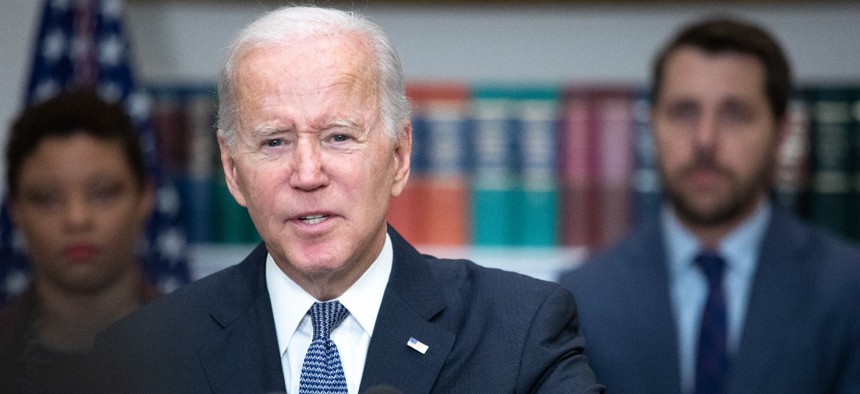
President Biden speaks at the White House in October, joined by OMB Director Shalanda Young and National Economic Council Director Brian Deese. Young and Deese sent a memo to House Speaker Kevin McCarthy asking him to agree that a debt default is off the table in budget negotiations and seeking more details on what the GOP would like to cut. Tom Brenner for The Washington Post via Getty Images
White House Makes Debt Ceiling, Budget Demands Ahead of McCarthy Meeting
Republicans should detail where they want to see cuts, Biden officials say.
The White House is turning up its pressure on House Republicans to release a budget blueprint for funding federal agencies while ensuring the government does not default on its debt, signaling that President Biden will make those demands in an upcoming meeting with the head of the majority caucus.
Ahead of Biden’s meeting with House Speaker Kevin McCarthy at the White House on Wednesday, administration officials released a memorandum calling on Republicans to commit to the “bedrock principle” that the United States not default. McCarthy and his colleagues have for weeks suggested they will not agree to raise the debt ceiling until Biden agrees to spending cuts. The White House and congressional Democrats have insisted the borrowing limit be suspended or increased without any preconditions.
“Does he agree with former presidents, including Presidents Trump and Reagan, that it is critical to avoid debt limit brinksmanship?” National Economic Council Director Brian Deese and Office of Management Budget Director Shalanda Young wrote in the memo. They added that raising the debt ceiling “is not a negotiation; it is an obligation of this country and its leaders to avoid economic chaos.”
In the meeting, the officials said, Biden will “seek a clear commitment” from McCarthy that default, or any workaround that similarly leads to the government not paying all of its bills, is off the table. Doing so would help to bring comfort to the American people, they said.
Deese and Young also called on Republicans to put forward a detailed budget proposal to unveil where, specifically, they want to make cuts. They noted McCarthy has agreed to vote on a budget resolution that could lead to non-defense agencies seeing drastic cuts of up to 25% and previous Republican proposals would make cuts to programs like Social Security, Medicare, Medicaid and nutrition assistance for low-income children.
“Any serious conversation about economic and fiscal policy needs to start with a clear understanding of the participants’ goals and proposals,” Deese and Young said. “Speaker McCarthy and his caucus need to transparently lay out to the American people their fiscal and economic proposals in the normal budget process.”
McCarthy on Tuesday acknowledged he received the letter but quickly dismissed its contents.
“I’m not interested in political games,” he said. “I’m coming to negotiate for the American people.”
The speaker told CBS News over the weekend the House would pass a budget and would “look at every single department” to identify savings. The White House officials announced Biden will release his fiscal 2024 budget on March 9.
“The budget will show how the President plans to invest in America, continue to lower costs for families, protect and strengthen Social Security and Medicare, and reduce the deficit,” they said.
Agencies are funded through Sept. 30 under the fiscal 2023 omnibus funding bill. Treasury Department Secretary Janet Yellen recently told lawmakers the government could default on its debts as soon as early June. Treasury is currently taking “extraordinary measures” to buy more time, such as suspending new investments into various federal retiree funds, as well as reinvestment into the Thrift Savings Plan's government securities (G) fund.
In a joint statement earlier in January, Senate Majority Leader Chuck Schumer, D-N.Y., and Hakeem Jeffries, D-N.Y., said even nearing a default could have significant impacts, as it did in 2011, and called for a quick resolution this time around.
“Democrats want to move quickly to pass legislation addressing the debt limit so there is no chance of risking a catastrophic default,” Schumer and Jeffries said. “Republican leaders must do the right thing to protect Social Security, the economy and our country.”
There is no blueprint for how the government would operate if it reached and broke through its debt ceiling, though it is clear agencies would not be able to carry out their normal operations. Because typical spending outpaces the revenue the Treasury Department brings in on a given day, the federal government would only be able to pay 60% of its bills in a given month of a default scenario, according to a Bipartisan Policy Center estimate.
Analysts and Treasury officials have sketched out two possible outcomes during a default: the government would either delay payments until it collected enough revenue to cover them, or prioritize some payments while allowing others to go unpaid. In either scenario, agency payments to beneficiaries, states, grantees, contractors and, potentially, their own employees, could be disrupted. Some federal workers could be furloughed or asked to continue working on the promise of back pay in the future.







